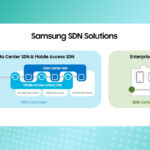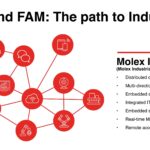ASIA ELECTRONICS INDUSTRYYOUR WINDOW TO SMART MANUFACTURING
Research to Dig Deep on 5G Promise in Advanced Factories
Harping on their shared vision to bring forth innovation, IBM and Verizon will collaborate to expand the capabilities of IBM’s Industry Solution Lab in Coppel, Texas to include a testbed environment for developing and testing innovative, 5G-enabled use cases for Industry 4.0 applications.
In his blog post, Steve Canepa, Global GM & Managing Director, IBM Communications Sector said the partnership would mean enterprise customers at the lab will be able to develop and test how Verizon 5G Ultra Wideband, which is being deployed in select cities across the United States, can be combined with hybrid cloud, edge, and artificial intelligence (AI) technologies to deliver a new class of intelligent applications and next generation use cases like robotics, guided vehicles, manufacturing process automation, visual quality inspection, data analytics and more.
Last year, IBM and Verizon announced a major collaboration to advance the era of 5G and edge computing in industrial operations, and just recently IBM’s Chief Executive Officer Arvind Krishna shared in a keynote address that it is working with Verizon to deploy a modern open hybrid cloud strategy across Verizon’s 5G network core and service orchestration platform.

Accelerates Industry 4.0 Transformation
Canepe said the lab demonstrates the power of optimizing solutions for a new era of hybrid cloud that leverages the growing relationship between ‘connectivity + compute’ to create new value. The lab will provide hands-on experience for enterprises as they seek ways to leverage the new 5G capabilities, which are reduced latency, increased bandwidth, network slicing and edge – by trialing new use cases and highly automated deployment and management approaches.
“To power these trial use cases, Verizon has installed 5G Ultra Wideband and its Multi-Access Edge Computing (MEC) platform to enable customers to experience the value of high speed, reliability, and ultra-low latency,” said Canepe.
“The approach includes the seamless integration of IBM’s hybrid cloud and AI technologies, which run on Red Hat OpenShift. Taken together, customers will have access to an environment that is designed to deliver a level of performance that enables truly innovative solutions and use cases to accelerate their transformation to Industry 4.0,” he added.
The testbed provides a pre-commercial, standalone 5G and MEC environment and technical resources and expertise needed to test and optimize products. Customers can co-create business-specific use cases and jointly work with IBM Global Business Services and our ecosystem partners to leverage these technologies in addressing current business challenges and bringing new solutions and services to market.
Initial Priority Areas
In the same blog post, Canepe enumerated initial priority areas to which ecosystem partners could leverage in the IBM and Verizon partnership.
Asset Monitoring and Optimization: Logistics and supply chain enterprises can use the IBM Maximo Application Suite and IBM Acoustic Insights to trial how they can incorporate ultrasonic technology to anticipate and mitigate malfunctioning of their package handling machinery. These enterprises can leverage IBM Maximo, Verizon IoT solutions, and the power of 5G, including on the edge of factory floors, to deliver business value now. IBM Maximo Predict is designed to illuminate insights about predicting and managing asset failure to reduce downtime. IBM Maximo Asset Monitor helps maintenance and operations leaders optimize operations with insights into failures at enterprise scale.
Field Worker Productivity and Safety: By using Maximo Mobile on devices with Verizon 5G, a company can trial scenarios where they use AI, remote human assistance, and real-time data to help foster on-the-job safety and enhance the quality and efficiency of field work with guided workflows, to reduce multiple repeat inspections and repairs of the same equipment. Other opportunities to enable field worker productivity include solutions like Ario, Verizon’s Built on 5G Challenge Winner that leverages AR to empower and train frontline workers.
Visual Inspection: Industrial product manufacturers can leverage IBM’s suite of visual inspection products, including IBM Maximo Visual Inspection. Mobile devices running the suite could be mounted on assembly lines, robotic arms, or even held or worn by the user to inspect components and finished goods for defects using near real-time insights to improve manufacturing processes. A supervisor who needs to manage inspections could take advantage of the user experience of the IBM Services Software Inspection Workbench app. By combining low latency connectivity and distributed AI across factory lines, manufacturers can scale visual inspections to help achieve quality targets across facilities globally.
Accelerate Tangible Business Impact
Canepe noted the joint 5G testbed with Verizon underscores IBM’s commitment to deepening partnerships with its clients and the ongoing investment in capabilities that include, centers of excellence and labs around the world.
“As hybrid cloud and AI fundamentally reshape the telco industry, we continue to enhance our global capabilities, which includes the recent announcement of the IBM Open RAN Center of Excellence in Spain.”
Canepe said IBM is dedicated to knowledge sharing and co-creation with telco clients that leverage the IBM Cloud for Telecommunications and large and growing partner ecosystem. The company’s approach is founded on the commitment to open hybrid cloud, industry standard interoperability and zero trust security that a 5G and edge future requires.
“Through IBM’s ongoing commitment to these centers and labs, one thing is clear: our goal is to accelerate tangible business impact for our customers through reduced time to value. This is more vital than ever, as telcos – and the customers they serve – are increasingly seeking new and proven ways to explore and harness the value of 5G and the power of ‘connectivity + compute.’,” Cenepe added.




